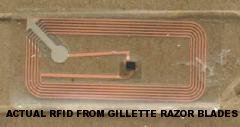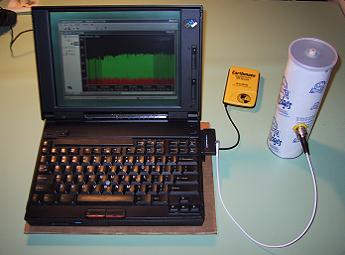GOVERNMENT TRYING TO SLIP RFID PAST US BY RENAMING
IT
by Ben Radstein, staff reporter
 Quite
a furor arose when consumers learned that
(RFID) tags had been put into
the products we buy on a regular basis. For those who do not know, RFID
stands for radio frequency identification. RFID chips, or "tags" are tiny
microchips connected to an antenna that send out whatever information they store
when a reader signals them. Gillette was one of the first manufacturers to use
these, and Wal-Mart was among the first retailers interested in the technology.
When people learned of this, many insisted that compromising our privacy and
possibly letting muggers know what we have, just so stores could take quicker
inventory was not a fair trade off. An even louder alarm was sounded when
the U.S. Government announced plans to integrate RFID chips into the next
generation of U.S. passports. After all, who knows who has an RFID reader?
Anyone who cared to, including thieves who want to steal your
identity and terrorists could read such passports. Americans traveling overseas
are targeted by terrorists for kidnapping and murder. With current passports, it
is hard for them to pick out who is an American. With chipped
passports, an RFID reader will tell them who to target quickly and easily. No one will ever know that their passport has been read.
Some have advocated wrapping these new passports in aluminum foil, or carrying
them in a metal case until we have to show them, but even that would leave
traveling Americans vulnerable during those moments, and try getting through a
metal detector!
Quite
a furor arose when consumers learned that
(RFID) tags had been put into
the products we buy on a regular basis. For those who do not know, RFID
stands for radio frequency identification. RFID chips, or "tags" are tiny
microchips connected to an antenna that send out whatever information they store
when a reader signals them. Gillette was one of the first manufacturers to use
these, and Wal-Mart was among the first retailers interested in the technology.
When people learned of this, many insisted that compromising our privacy and
possibly letting muggers know what we have, just so stores could take quicker
inventory was not a fair trade off. An even louder alarm was sounded when
the U.S. Government announced plans to integrate RFID chips into the next
generation of U.S. passports. After all, who knows who has an RFID reader?
Anyone who cared to, including thieves who want to steal your
identity and terrorists could read such passports. Americans traveling overseas
are targeted by terrorists for kidnapping and murder. With current passports, it
is hard for them to pick out who is an American. With chipped
passports, an RFID reader will tell them who to target quickly and easily. No one will ever know that their passport has been read.
Some have advocated wrapping these new passports in aluminum foil, or carrying
them in a metal case until we have to show them, but even that would leave
traveling Americans vulnerable during those moments, and try getting through a
metal detector!
The Government, and the RFID manufacturers who supply them
have heard these concerns, and are trying to trick us. Now, they say they won't use RFID. Instead, they will use
"contactless chips", "proximity chips" or "contactless integrated
circuits". Do not be fooled by this spin doctoring. They are
still RFID. No amount of doublespeak will change that. They have tried these
word games before. One example is renaming
Total Information Awareness as
Terrorism Information Awareness. Congress was not fooled, and de-funded that
program.
 The
manufacturers of these devices insist that they have a limited range, but
hackers have always been able to build antennas to extend the range of any
wireless device. Sometimes a simple Pringles can, a coax connector and a
soldering iron are all they need to rig one up. A similar home-brewed
contraption was how they got
Paris Hilton's address book. Also, if a hacker, mugger or terrorist's RFID reader is too far away from a chipped
passport, it can always piggyback data from a legitimate reader, and no one will
ever know.
The
manufacturers of these devices insist that they have a limited range, but
hackers have always been able to build antennas to extend the range of any
wireless device. Sometimes a simple Pringles can, a coax connector and a
soldering iron are all they need to rig one up. A similar home-brewed
contraption was how they got
Paris Hilton's address book. Also, if a hacker, mugger or terrorist's RFID reader is too far away from a chipped
passport, it can always piggyback data from a legitimate reader, and no one will
ever know.
This spring, the Department of Homeland Security will
begin using RFID on the badges of all employees, replacing magnetic strips. They claim that this will save money because physical conduct
wears out magnetic strips and readers. While this assertion is true, it isn't
their only motivation. You may be tempted to write this off as boys with a new
toy who want to play with it, but it is much more than that. This
part of the growing surveillance society the power hungry have dreamt of. If
they get away with this at the Homeland Security department, next private
employers will constantly track workers. Our drivers licenses will be in the air
and up for grabs to any identity thief. Police and government officials, some of
whom are corrupt, will be able to watch, but who will watch the watchers? The calendar may say 2005, but it feels a lot like
1984.
Before you say we need to loosen our tinfoil hats, please
visit these informative links about RFID and its implications.
http://www.spychips.com/
Wired: RFID Cards Get Spin Treatment
Wired: Passport Chip Criticism grows
Picking Virtual Pockets using
Relay Attacks on Contactless Smartcard Systems
 Quite
a furor arose when consumers learned that
(RFID) tags had been put into
the products we buy on a regular basis. For those who do not know, RFID
stands for radio frequency identification. RFID chips, or "tags" are tiny
microchips connected to an antenna that send out whatever information they store
when a reader signals them. Gillette was one of the first manufacturers to use
these, and Wal-Mart was among the first retailers interested in the technology.
When people learned of this, many insisted that compromising our privacy and
possibly letting muggers know what we have, just so stores could take quicker
inventory was not a fair trade off. An even louder alarm was sounded when
the U.S. Government announced plans to integrate RFID chips into the next
generation of U.S. passports. After all, who knows who has an RFID reader?
Anyone who cared to, including thieves who want to steal your
identity and terrorists could read such passports. Americans traveling overseas
are targeted by terrorists for kidnapping and murder. With current passports, it
is hard for them to pick out who is an American. With chipped
passports, an RFID reader will tell them who to target quickly and easily. No one will ever know that their passport has been read.
Some have advocated wrapping these new passports in aluminum foil, or carrying
them in a metal case until we have to show them, but even that would leave
traveling Americans vulnerable during those moments, and try getting through a
metal detector!
Quite
a furor arose when consumers learned that
(RFID) tags had been put into
the products we buy on a regular basis. For those who do not know, RFID
stands for radio frequency identification. RFID chips, or "tags" are tiny
microchips connected to an antenna that send out whatever information they store
when a reader signals them. Gillette was one of the first manufacturers to use
these, and Wal-Mart was among the first retailers interested in the technology.
When people learned of this, many insisted that compromising our privacy and
possibly letting muggers know what we have, just so stores could take quicker
inventory was not a fair trade off. An even louder alarm was sounded when
the U.S. Government announced plans to integrate RFID chips into the next
generation of U.S. passports. After all, who knows who has an RFID reader?
Anyone who cared to, including thieves who want to steal your
identity and terrorists could read such passports. Americans traveling overseas
are targeted by terrorists for kidnapping and murder. With current passports, it
is hard for them to pick out who is an American. With chipped
passports, an RFID reader will tell them who to target quickly and easily. No one will ever know that their passport has been read.
Some have advocated wrapping these new passports in aluminum foil, or carrying
them in a metal case until we have to show them, but even that would leave
traveling Americans vulnerable during those moments, and try getting through a
metal detector! The
manufacturers of these devices insist that they have a limited range, but
hackers have always been able to build antennas to extend the range of any
wireless device. Sometimes a simple Pringles can, a coax connector and a
soldering iron are all they need to rig one up. A similar home-brewed
contraption was how they got
The
manufacturers of these devices insist that they have a limited range, but
hackers have always been able to build antennas to extend the range of any
wireless device. Sometimes a simple Pringles can, a coax connector and a
soldering iron are all they need to rig one up. A similar home-brewed
contraption was how they got